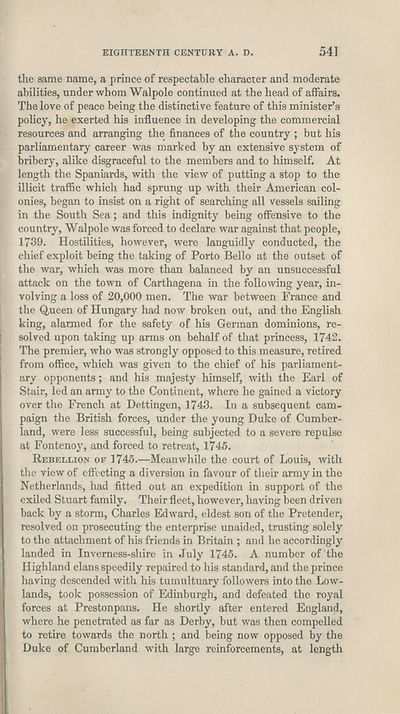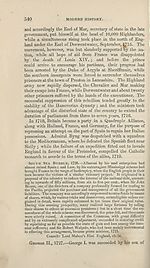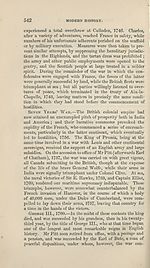Download files
Complete book:
Individual page:
Thumbnail gallery: Grid view | List view

EIGHTEENTH CENTURY A. D.
541
the same name, a prince of respectable character and moderate
abilities, under whom Walpole continued at the head of affairs.
The love of peace being the distinctive feature of this minister’s
policy, he exerted his influence in developing the commercial
resources and arranging the finances of the country ; but his
parliamentary career was marked by an extensive system of
bribery, alike disgraceful to the members and to himself. At
length the Spaniards, with the view of putting a stop to the
illicit traffic which had sprung up with their American col¬
onies, began to insist on a right of searching all vessels sailing
■ in the South Sea; and this indignity being offensive to the
? country, Walpole was forced to declare war against that people,
1739. Hostilities, however, were languidly conducted, the
! chief exploit being the taking of Porto Bello at the outset of
the war, which was more than balanced by an unsuccessful
i attack on the town of Carthagena in the following year, in¬
volving a loss of 20,000 men. The war between France and
the Queen of Hungary had now broken out, and the English
king, alarmed for the safety of his German dominions, re¬
solved upon taking up arms on behalf of that princess, 1742.
The premier, who was strongly opposed to this measure, retired
from office, which was given to the chief of his parliament¬
ary opponents; and his majesty himself, with the Earl of
Stair, led an army to the Continent, where he gained a victory
over the French at Dettingen, 1743. In a subsequent cam¬
paign the British forces, under the young Duke of Cumber¬
land, were less successful, being subjected to a severe repulse
at Fontenoy, and forced to retreat, 1745.
Rebellion of 1745.—Meanwhile the court of Louis, with
the view of effecting a diversion in favour of their army in the
Netherlands, had fitted out an expedition in support of the
exiled Stuart family. Their fleet, however, having been driven
back by a storm, Charles Edward, eldest son of the Pretender,
resolved on prosecuting the enterprise unaided, trusting solely
to the attachment of his friends in Britain ; and he accordingly
landed in Inverness-shire in July 1745. A number of the
Highland clans speedily repaired to his standard, and the prince
having descended with his tumultuary followers into the Low¬
lands, took possession of Edinburgh, and defeated the royal
forces at Prestonpans. He shortly after entered England,
where he penetrated as far as Derby, but was then compelled
to retire towards the north ; and being now opposed by the
Duke of Cumberland with large reinforcements, at length
541
the same name, a prince of respectable character and moderate
abilities, under whom Walpole continued at the head of affairs.
The love of peace being the distinctive feature of this minister’s
policy, he exerted his influence in developing the commercial
resources and arranging the finances of the country ; but his
parliamentary career was marked by an extensive system of
bribery, alike disgraceful to the members and to himself. At
length the Spaniards, with the view of putting a stop to the
illicit traffic which had sprung up with their American col¬
onies, began to insist on a right of searching all vessels sailing
■ in the South Sea; and this indignity being offensive to the
? country, Walpole was forced to declare war against that people,
1739. Hostilities, however, were languidly conducted, the
! chief exploit being the taking of Porto Bello at the outset of
the war, which was more than balanced by an unsuccessful
i attack on the town of Carthagena in the following year, in¬
volving a loss of 20,000 men. The war between France and
the Queen of Hungary had now broken out, and the English
king, alarmed for the safety of his German dominions, re¬
solved upon taking up arms on behalf of that princess, 1742.
The premier, who was strongly opposed to this measure, retired
from office, which was given to the chief of his parliament¬
ary opponents; and his majesty himself, with the Earl of
Stair, led an army to the Continent, where he gained a victory
over the French at Dettingen, 1743. In a subsequent cam¬
paign the British forces, under the young Duke of Cumber¬
land, were less successful, being subjected to a severe repulse
at Fontenoy, and forced to retreat, 1745.
Rebellion of 1745.—Meanwhile the court of Louis, with
the view of effecting a diversion in favour of their army in the
Netherlands, had fitted out an expedition in support of the
exiled Stuart family. Their fleet, however, having been driven
back by a storm, Charles Edward, eldest son of the Pretender,
resolved on prosecuting the enterprise unaided, trusting solely
to the attachment of his friends in Britain ; and he accordingly
landed in Inverness-shire in July 1745. A number of the
Highland clans speedily repaired to his standard, and the prince
having descended with his tumultuary followers into the Low¬
lands, took possession of Edinburgh, and defeated the royal
forces at Prestonpans. He shortly after entered England,
where he penetrated as far as Derby, but was then compelled
to retire towards the north ; and being now opposed by the
Duke of Cumberland with large reinforcements, at length
Set display mode to:
![]() Universal Viewer |
Universal Viewer | ![]() Mirador |
Large image | Transcription
Mirador |
Large image | Transcription
| Antiquarian books of Scotland > Education > Elements of universal history on a new and systematic plan > (561) |
|---|
| Permanent URL | https://digital.nls.uk/127586872 |
|---|
| Description | Thousands of printed books from the Antiquarian Books of Scotland collection which dates from 1641 to the 1980s. The collection consists of 14,800 books which were published in Scotland or have a Scottish connection, e.g. through the author, printer or owner. Subjects covered include sport, education, diseases, adventure, occupations, Jacobites, politics and religion. Among the 29 languages represented are English, Gaelic, Italian, French, Russian and Swedish. |
|---|

